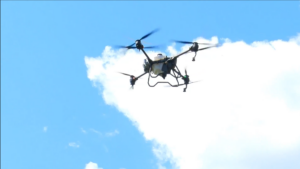Coming Regulatory Changes in Drone Pesticide Application
go.ncsu.edu/readext?999985
en Español / em Português
El inglés es el idioma de control de esta página. En la medida en que haya algún conflicto entre la traducción al inglés y la traducción, el inglés prevalece.
Al hacer clic en el enlace de traducción se activa un servicio de traducción gratuito para convertir la página al español. Al igual que con cualquier traducción por Internet, la conversión no es sensible al contexto y puede que no traduzca el texto en su significado original. NC State Extension no garantiza la exactitud del texto traducido. Por favor, tenga en cuenta que algunas aplicaciones y/o servicios pueden no funcionar como se espera cuando se traducen.
Português
Inglês é o idioma de controle desta página. Na medida que haja algum conflito entre o texto original em Inglês e a tradução, o Inglês prevalece.
Ao clicar no link de tradução, um serviço gratuito de tradução será ativado para converter a página para o Português. Como em qualquer tradução pela internet, a conversão não é sensivel ao contexto e pode não ocorrer a tradução para o significado orginal. O serviço de Extensão da Carolina do Norte (NC State Extension) não garante a exatidão do texto traduzido. Por favor, observe que algumas funções ou serviços podem não funcionar como esperado após a tradução.
English
English is the controlling language of this page. To the extent there is any conflict between the English text and the translation, English controls.
Clicking on the translation link activates a free translation service to convert the page to Spanish. As with any Internet translation, the conversion is not context-sensitive and may not translate the text to its original meaning. NC State Extension does not guarantee the accuracy of the translated text. Please note that some applications and/or services may not function as expected when translated.
Collapse ▲Interest in the use of unmanned aerial vehicles (UAVs), or drones as they are more commonly known, for pesticide application has exploded across the country, and North Carolina is no exception. Growing pains associated with regulating the industry have been outpaced by the rapid advancement of technology, but changes are coming. While commercial aerial application regulations were adapted to include UAVs, current regulations allow private pesticide applicators to use drones to apply pesticides on their own property. However, regulations affecting both current and future aerial pesticide applicators are expected to be implemented in the coming year which will impact both private and commercial applicators.
Overview of Regulations
There are currently several regulations and a license required to apply pesticides by drones commercially. This includes compliance with FAA certification (14 CFR Part 107) for drones under 55 pounds, or with waivers for heavier drones, and a certificate (14 CFR Part 137) for dispensing “economic poisons” (as pesticides are referred to in the regulations). Additionally, drone operators must pass a skills and knowledge test, register their UAV with the FAA, and in North Carolina, pass the NCDOT’s Unmanned Aircraft System Operator’s Knowledge Test for a state permit.
Prospective licensed (commercial) aerial applicators must pass three exams: the North Carolina Pesticide Applicator Core exam, the Aerial Methods exam, and one specialty category exam relevant to their work. If you are a new drone applicator, you must first hold an aerial apprentice license, requiring supervision by a licensed pilot, documenting 125 hours of operation, and one year of flying experience. There is a $25 annual inspection fee per aircraft. The North Carolina Department of Agriculture and Consumer Services (NCDA&CS) provides the examinations (available as both in-person and online exams), with links available for registration, exam sites, fees, and study materials. Commercial application of pesticides without proper licensing can lead to civil penalties, emphasizing the importance of adhering to regulatory requirements.
Upcoming Changes
Recent changes to the federal regulations concerning aerial application will require private applicators to meet the same certification and documentation criteria as those required of commercial applicators. The NCDA&CS has published a document “Guidance on How to Become a Licensed UAV Pesticide Applicator,” to help both commercial and private applicators navigate the process. You can find this guidance on the NCDA&CS website listed in the “Structural Pest Control and Pesticides Division” under Additional Pesticide Information “How to Become a Licensed UAV Pesticide Applicator” OR under “Licensing & Certification” on the same page. Contact the NCDA&CS at 984-236-4627 if you have questions regarding pesticide applicator certification and licensing.



